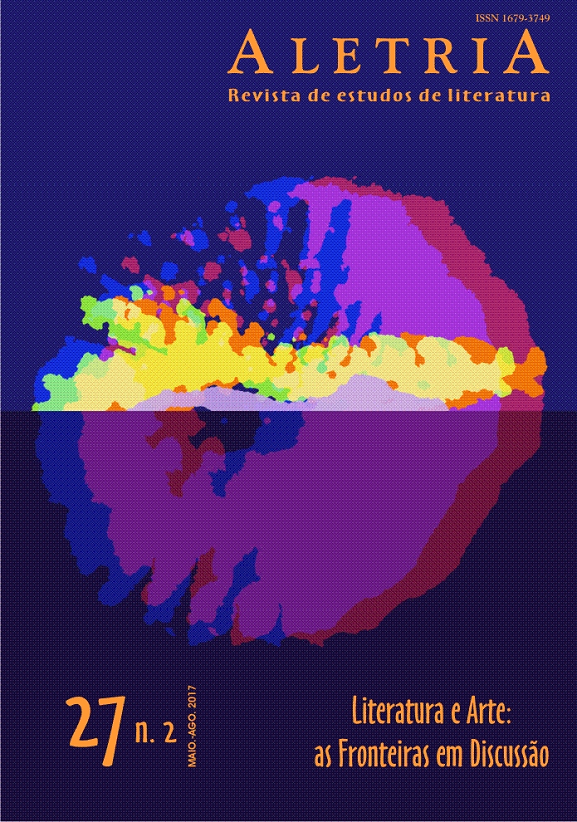W. G. Sebald: pós-memória, palavra e imagem
DOI :
https://doi.org/10.17851/2317-2096.27.2.209-224Mots-clés :
W. G. Sebald, pós-memória, palavra, imagemRésumé
O objetivo do artigo é propor uma leitura da poética de W. G. Sebald a partir da noção de “pós-memória” e sua específica contribuição para o debate acerca das relações entre palavra e imagem. São expostos três momentos de análise: em primeiro lugar, o uso ecfrástico que faz Sebald de Albrecht Altdorfer em seu poema “Nach der Natur” (1988); em segundo lugar, a apropriação do Roland Barthes de A câmara clara feita em uma entrevista; e, finalmente, a leitura detida de uma das seções de Vertigem (1990), na qual a figura de Franz Kafka é aproximada à de Jean Paul. A hipótese é de que a fronteira que rege as passagens entre palavra e imagem diz respeito também ao contato entre memória e experiência, desembocando em uma reflexão acerca da constituição do sujeito histórico e seu acesso ao discurso e à arte.
Téléchargements
Références
AGAMBEN, Giorgio. Ninfe. Torino: Bollati Boringhieri, 2007.
AGAZZI, Elena. “Divertissement” teratologici in Jean Paul. La Ricerca Folklorica, Italia, n. 33, p. 67-71, abr. 1996. Disponível em: http://www.jstor.org/stable/1480094. Acesso em: 8 maio 2017.
BALTRUSAITIS, Jurgis. Aberrações: ensaio sobre a lenda das formas. Tradução de Vera Harvey. Rio de Janeiro: Editora UFRJ, 1999.
BARTHES, Roland. A câmara clara: nota sobre a fotografia. Tradução de Júlio Castañon Guimarães. Rio de Janeiro: Nova Fronteira, 1984.
HIRSCH, Marianne. Family Frames: Photography, Narrative, and Postmemory. Cambridge, Mass.: Harvard University Press, 1997.
HIRSCH, Marianne. Projected Memory: Holocaust Photographs and the Work of Postmemory. In: ZELIZER, Barbie (Ed.). Visual Culture and the Holocaust. London: Athlone, 2001. p. 215-246.
KLEBES, Martin. If You Come to a Spa: Displacing the Cure in Schwindel. Gefühle. and Austerlitz. In: ZISSELSBERGER, Markus (Ed.). The Undiscover’d Country: W. G. Sebald and the Poetics of Travel. New York: Camden House, 2010. p. 123-141.
LONG, Jonathan J. W. G. Sebald: Image, Archive, Modernity. New York: Columbia University Press, 2008.
ÖHLSCHLÄGER, Claudia; NIEHAUS, Michael (Ed.). W.G. Sebald-Handbuch. Stuttgart: J. B. Metzler, 2017.
SCHOLZ, Christian. But the Written Word Is Not a True Document: A Conversation with W. G. Sebald on Literature and Photography. In: PATT, Lise (Ed.). Searching for Sebald: Photography after W. G. Sebald. Los Angeles: The Institute of Cultural Inquiry, 2007. p. 104-109.
SEBALD, W. G. Do natural: um poema elementar. Tradução de Telma Costa. Lisboa: Quetzal, 2012.
SEBALD, W. G. Guerra aérea e literatura: com ensaio sobre Alfred Andersch. Tradução de Carlos Abbenseth e Frederico Figueiredo. São Paulo: Companhia das Letras, 2011.
SEBALD, W. G. Os emigrantes: quatro narrativas longas. Tradução de José Marcos Macedo, São Paulo: Companhia das Letras, 2009.
SEBALD, W. G. Pátria apátrida: ensaios sobre literatura austríaca. Tradução de Telma Costa. Lisboa: Teorema, 2010.
WECHSLER, Judith. A Human Comedy: Physiognomy and caricature in th Century. Paris, Chicago, London: University of Chicago Press, 1982.
ZISSELSBERGER, Markus. Melancholy Longings: Sebald, Benjamin, and the Image of Kafka. In: PATT, Lise (Ed.). Searching for Sebald: Photography after W. G. Sebald. Los Angeles: The Institute of Cultural Inquiry, 2007. p. 280-301.
Téléchargements
Fichiers supplémentaires
Publiée
Numéro
Rubrique
Licence
(c) Copyright Kelvin Falcão Klein (Autor) 2017

Ce travail est disponible sous la licence Creative Commons Attribution 4.0 International .
Authors who publish with this journal agree to the following terms:Authors retain copyright and grant the journal right of first publication with the work simultaneously licensed under a Creative Commons Attribution Non-Commercial No Derivatives License that allows others to share the work with an acknowledgement of the work's authorship and initial publication in this journal.Authors are able to enter into separate, additional contractual arrangements for the non-exclusive distribution of the journal's published version of the work (e.g., post it to an institutional repository or publish it in a book), with an acknowledgement of its initial publication in this journal.Authors are permitted and encouraged to post their work online (e.g., in institutional repositories or on their website) prior to and during the submission process, as it can lead to productive exchanges, as well as earlier and greater citation of published work (See The Effect of Open Access).









